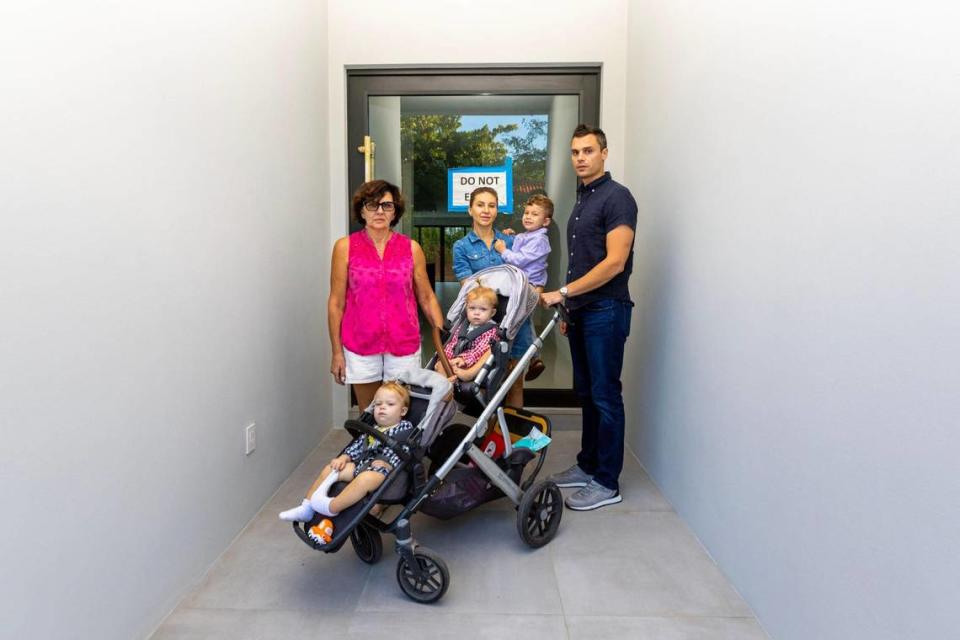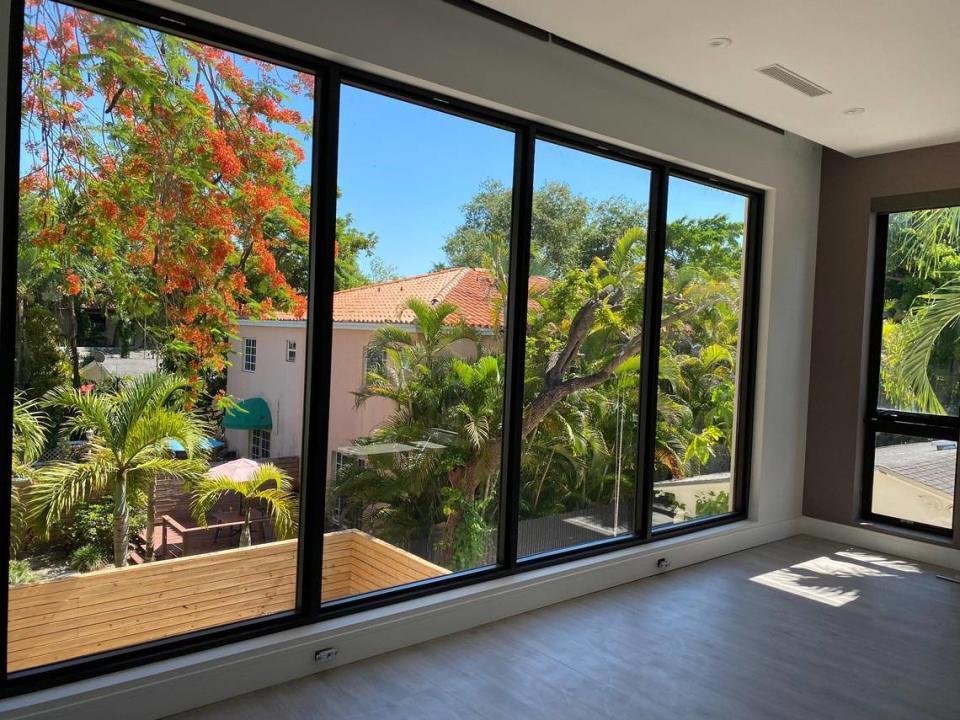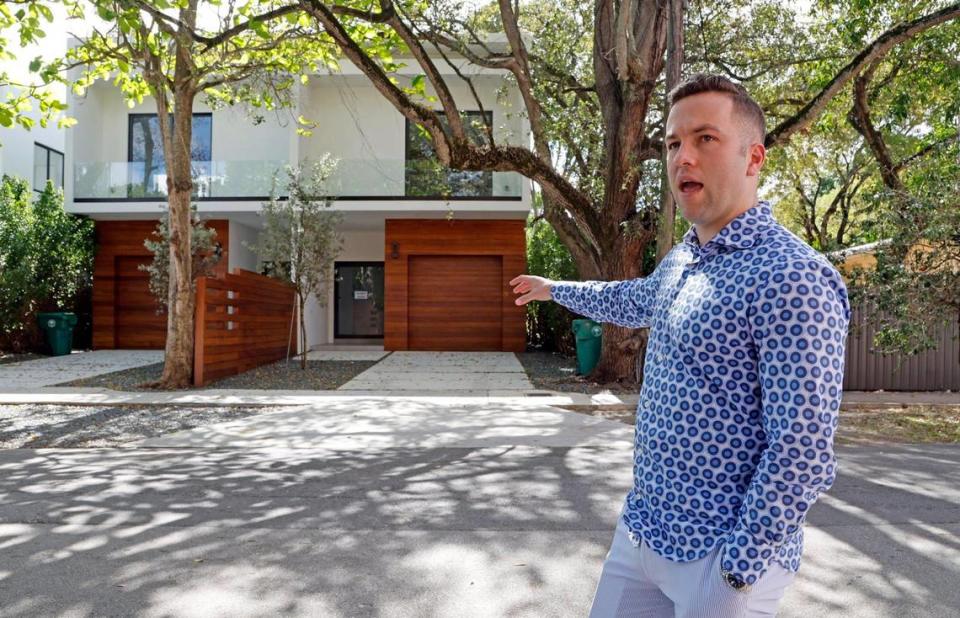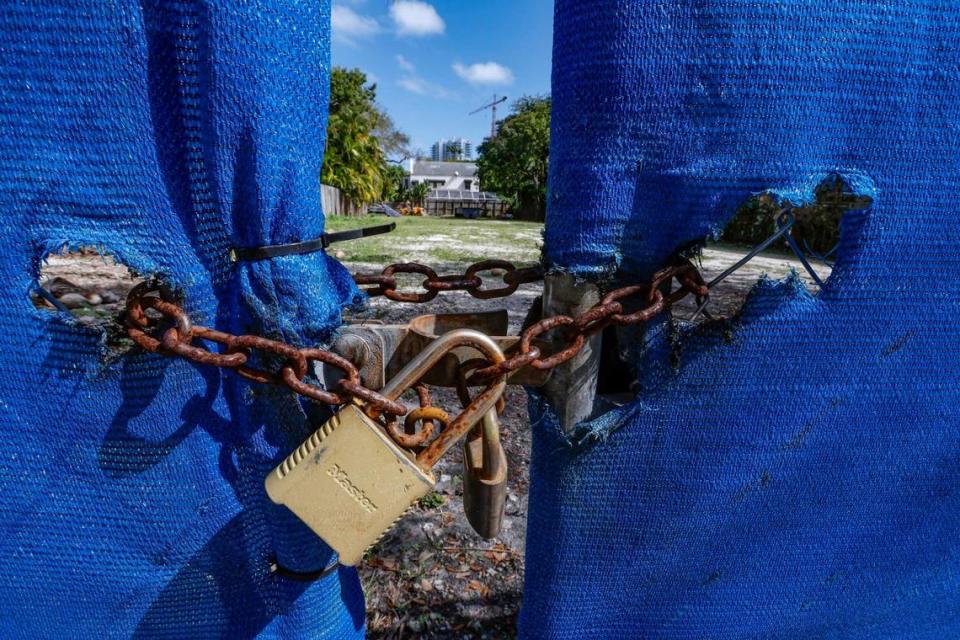‘King of Coconut Grove’ faces foreclosure. His buyers could lose their homes
For years, real estate developer Doug Cox has kept buyers locked out of the homes they bought in Coconut Grove. Now his lender is foreclosing on the properties, demanding to take control of two dozen ready-to-move-in houses and prime vacant lots because Cox has failed to repay a $43 million debt.
But the buyers got a lifeline Tuesday when Miami-Dade Circuit Court Judge Jennifer Bailey appointed a receiver to oversee a tangled web of lawsuits, purchase contracts and fraud accusations centered on Cox, who has not closed on the properties despite collecting millions in deposits from buyers and investors.
READ MORE: They bought their dream homes from the ‘King of Coconut Grove.’ They still can’t move in
One of the houses he built, which has doubled in value to $2.5 million since it was first sold, has three contracts on it simultaneously, unbeknownst to the buyers until recently.
“I will grant the emergency motion and appoint Judge Fine as receiver to marshal and maintain the assets,” Bailey said to Alan Fine, who recently retired as a Miami-Dade circuit court judge to open an arbitration firm. “You’ve got to get in there and figure out what’s going on. I think that’s step one in getting this case under control.
“I’m still on the who’s-on-first stage.”
Altamar Financial Group sued Cox and the companies he runs with his common-law wife, Nicole Pearl, alleging they defaulted on a $34.1 million mortgage signed in 2019. After six extensions and with interest accruing at 24.5 percent, or $22,251.37 per day, Cox, Pearl, Send Enterprises and Drive Development owe $43,087,028 according to the May 5 court filing.
Buyers who put down their life’s savings and fear losing their dream homes to Altamar hope the receiver can broker a solution.
“It sounds like Judge Bailey has the best interests of the buyers in mind and will try to do right by the victims,” said Michael Coyne, a New York transplant whose family includes his wife, three young children and parents-in-law who fled Ukraine. They have rented six different places while awaiting their closing date.
Coyne bought their new $1.6 million townhouse at 2978 Coconut Ave. in 2021 and gave Cox a $487,500 deposit with promises that finishing touches were nearly complete and they’d be in within 90 days. “I’ve also written to Altamar asking if they will honor our purchase contracts.”

Phillip Sylvester, a real estate investor who originally hired Cox to build homes in 2014 and then formed a joint venture with Cox in 2019 to buy more land and build more homes, says Cox owes him at least $6 million. Sylvester sought the receiver after discovering Cox was violating their agreement and shutting out buyers, he said in his complaint.
Ponzi scheme allegations
“The only people opposed to a receiver are Cox and Pearl, whose actions necessitated a receiver,” Sylvester’s lawyer, Marcos Jiménez, a former U.S. Attorney in Miami, said during the hearing. “The receiver can investigate this Ponzi scheme to take deposits and funds from investors and use the properties to perpetrate fraud. We need to move quickly as they attempt to turn off the bright lights of justice and continue to operate in the darkness.”
Sylvester’s emergency motion to appoint a receiver states: “As revealed in a recent Miami Herald investigative report and the multiple lawsuits that followed, Counter-Defendant Send and its affiliates (the “Send Defendants”) are depleting and wasting the real estate properties at issue (the “Properties”) and fraudulently procuring deposits paid by prospective buyers. The most recent lawsuit, filed just last week, shows that the Send Defendants are now even writing bad checks to retain fraudulently procured deposits.”
A receiver is necessary because, Sylvester argues in court papers, “Cox and Pearl are also likely insolvent and would be unable to remedy their numerous breaches and bad acts through damages.”
Cox’s lawyer Mark Raymond argued the contracts signed by buyers require arbitration and prohibit lawsuits, so all conflicts with Cox must be resolved through arbitration.
“This is a business dispute,” Raymond said during Tuesday’s hearing. “No money has gone anywhere. The houses are ready to be delivered once the certificates of occupancy are issued. It’s a money dispute with Phillip Sylvester who wants to take right of first refusal and wipe out the buyers, who don’t even know that. We want the buyers to acquire the houses. I’m quite sure the buyers are unaware he can wipe them out.”
Bailey disagreed: “I’m confident it’s not a business dispute. They have contracts for the houses.”

Double, triple contracts
At least four houses have double contracts on them and one of them has a triple contract on it. Multiple purchase contracts on one property are illegal. A townhouse at 2960 Coconut Ave. has had at least four contracts, records show. The original buyer canceled his 2020 contract, got his deposit back late last year and was forced to sign a non-disclosure agreement, although he spoke to the Miami Herald despite a threat of retaliation by Cox, he said.
Three other people have contracts on the 4,000-square-foot townhouse now, including one for $2.475 million with a $742,500 deposit from February 2022 and one for $2.375 million with a $1.52 million deposit from January, according to lawsuits. The third one, amount unspecified, was signed in December, according to court records.

About a half dozen lawsuits have been filed by buyers who claim they’ve been duped by Cox since a Miami Herald story in March revealed the plight of people who bought houses and lots from Cox, who calls himself the “King of Coconut Grove.” They’ve lived in limbo — in expensive rentals or with relatives and friends, their belongings in storage — awaiting perpetually postponed closing dates as the housing market and interest rates skyrocketed. Cox has stopped communicating with them. He hasn’t even pulled building permits for exquisite renderings of houses on lots that sit empty in the red-hot Grove.
Cox has blamed delays on the city of Miami’s building department and the engineering company he hired to do inspections. But based on patterns documented in the city’s iBuild website, buyers say Cox is deliberately stalling his attempts to acquire certificates of occupancy because he does not have the money to pay off his mortgages, clear titles and close deals with buyers. Cox has not closed a home sale since 2019.
Cox has taken deposits for his personal use, buyers and investors claim, because they’ve seen no evidence of construction work for years. When disgusted buyers canceled their contracts, Cox resold properties at higher prices and collected higher deposits, which he could “utilize” as he pleased, as stipulated in the contracts buyers signed.
READ MORE: Real estate contracts tend to favor developers. What homebuyers should watch out for
But as demand for refunds of deposits accelerated in recent months, the juggling act collapsed, with one buyer providing a photocopy of a bounced check in his lawsuit against Cox.
Rafael Isola and Maria Del Mar Velez sued Cox and Pearl on April 24, alleging “breach of contract, deceptive and unfair trade practices and fraud” stemming from their March 2022 contract for a vacant lot and house to be constructed at 2050 Secoffee St. for $4.85 million with a deposit of $1.456 million. The couple included in the suit a bounced check from Cox that was to be a refund of their deposit.

Cox has declined interview requests from the Herald.
“They have been fighting so long to keep everything secret, but their game is finally over,” said Coconut Avenue townhouse buyer Kevin Ware. “We hope the receiver can get into the weeds and find forensic evidence showing if Doug and Nicole misappropriated funds. We hope innocent families will not be wiped out by what all signs point to as a Ponzi scheme falling apart.”

Altamar’s cooperation will be critical, buyers say, as the properties are collateral on the loan.
“It’s not going to be as easy as the lender just putting these houses on the auction block,” Ware said. “This loan was made four years ago when construction was virtually finished. Serious questions need to be asked about the loan. Where was the due diligence? Where did the money go? You don’t need to be a rocket scientist to see that this smells.
“The good thing is that Doug Cox and Nicole Pearl cannot sell any more houses or sabotage any more lives.”



